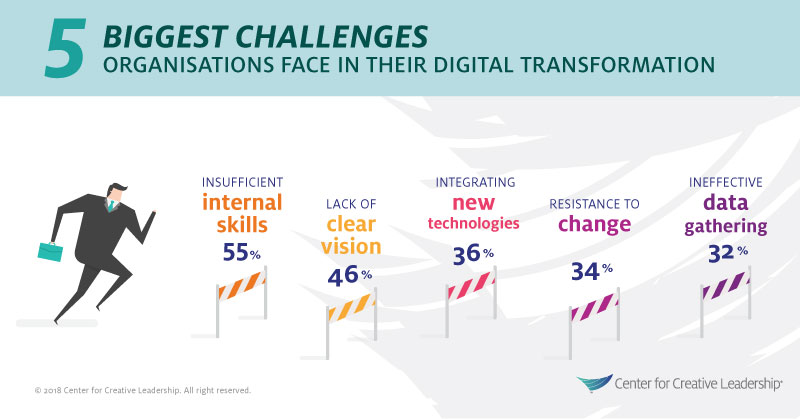Introduction
The old management models — and the old companies — are coming crashing down. Traditional modes of operation that worked for decades don’t work anymore, and only those that truly transform their digital processes from the ground up will survive.
Consider Nokia — once one of the world’s leading providers of hardware, leading the mobile phone market. Following the disruption of their industry (led by Apple), they sold their mobile devices division and transformed into one of the world’s biggest wireless network providers.
Digital transformation isn’t about riding out a storm and hoping it will pass. It’s about embracing change – and accelerating it. By understanding the connections between technology and people, small ideas can grow big in a very short time frame. This isn’t easy, and it doesn’t happen overnight. But it’s essential to both future leadership capabilities and organizational health to get started.
Our Research
To find out how organizations are going about this transformation, identify common challenges, and highlight the most successful strategies for success, we worked with CorporateLeaders to survey 100 European VPs and directors in HR, L&D, leadership development, and talent management to better understand how organizations are preparing for digital transformation from a strategy and leadership perspective.
Several themes emerged from the survey, including the need for steady and visionary leadership in times of transformation. Leaders also need to be, or rapidly become, digitally savvy.
In our experience, the key to unlocking greater digital impact is not just a question of implementation or adoption. Leaders and IT teams need to partner to drive innovation. But more importantly, digital change must be managed and understood by all tiers of the organization. Too often current models of leadership are still bound within traditional linear and hierarchical organization models, which kill off innovation and digital transformation. In many instances, cultural change needs to be implemented before the transformation process can begin.
Digital corporate cultures, much like software applications, are networks. Organizations need to create a networking framework and architecture that is far more flexible and capable of absorbing shocks. This survey gives crucial insights into how organizations are starting the journey, and how much further they still need to go.
Survey participants identified their top challenges, and several trends emerged. Here are the Top 5:
- Insufficient internal skills
- Lack of a clear vision for a digital customer journey
- Integrating new technologies
- Resistance to change
- Ineffective data gathering
It might surprise some people that these primary challenges aren’t as tech-oriented as they are leadership-based. Vision, integration, and overcoming resistance are all classic leadership skills that must come from the top.
The call for internal digital skills training to be rolled out within organizations is clear. There’s an urgent need for organizations to optimize their internal capacity and undertake internal talent search programs.
In a sense, that’s a quick win. Pools of skilled digital employees likely exist amongst the employee base, and not just in the IT department. Once organizations have announced their vision and digital transformation strategy, they need to identify and nurture those who are able to own and implement these changes within their teams.
Our survey also looked at how organizations are leveraging digital to innovate; explored the digital disconnect between business units, teams, and functions; considered how organizations are implementing digital leadership; and gleaned some of the most effective tactics for digital transformation.
The most effective tactic overall? Pilot programs. These initiatives need to be rolled out quickly if they’re successful, because for every large organization that’s piloting programs, there are 100 disruptive start-ups who are prepared to jump right in.
Our survey respondents ranked “culture change led from the top” as the second most effective tactic for digital transformation, followed closely by a “clear digital strategy with well-defined priorities.”
Download Research Report
To see what else we learned and explore our findings in more detail, download the complete report.









